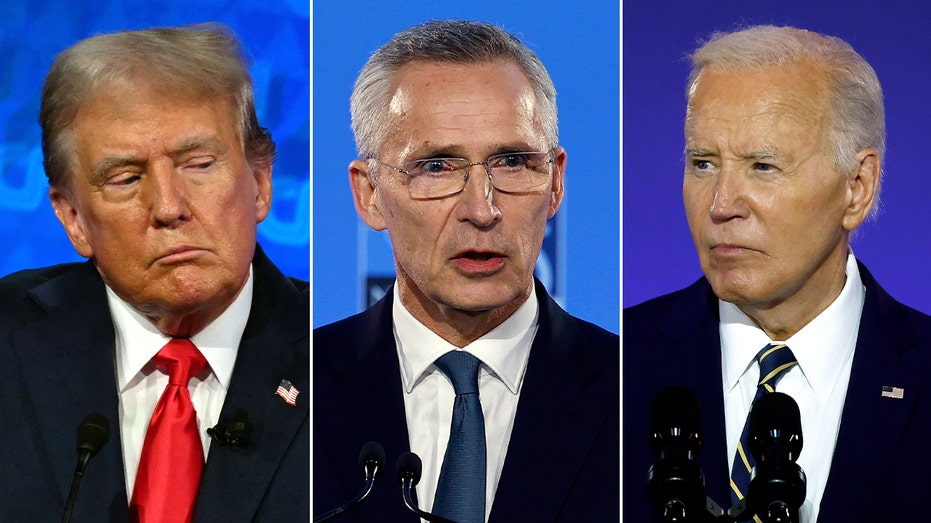NATO's Stoltenberg sidesteps Biden, Trump spat, champions nations hitting spending targets
Secretary General Jens Stoltenberg sidestepped debate over who is to thank for the increase in NATO nations meeting their defense spending pledges as Biden and Trump champion successes.

As the NATO summit drew to a close Thursday, signs the contentious U.S. presidential race was just kicking off became increasingly clear as President Biden and former President Trump used the international event as an opportunity to bolster their campaigns.
Speaking with Brian Kilmeade on Fox News radio, NATO Secretary General Jens Stoltenberg refused to credit just one man when it comes to the jump in GDP defense spending that NATO nations have made in 2024. Twenty-three of the 32 allies have now met their 2% commitments.
"Former President Trump had a very clear message that the European allies had to pay more. This has been a message from consecutive U.S. administrations, and this message has had an impact," Stoltenberg said during his interview on ‘The Brian Kilmeade Show.'
ZELENSKYY SAYS UKRAINE CAN'T WIN WAR UNLESS US LIFTS LIMITS ON STRIKING MILITARY TARGETS IN RUSSIA
Trump and Biden have pointed to the record number of NATO nations hitting their GDP defense spending commitments, first pledged in 2006, as significant accomplishments of their corresponding presidencies.
Trump has been vocal in saying he forced NATO allies to pony up during his tenure.
The number of allies to meet their spending commitments did increase to nine in 2020 from the five nations who met their commitments in 2016 when he entered office. That number dropped to six once he left in 2021.
The greatest jump in NATO defense expenditure occurred this year when, for the first time ever, 23 of the 32 nations under the alliance met their spending agreements.
Supporters of Trump point to the war in Ukraine, not the Biden administration, as the main driving force behind this jump in European defense spending.
Canada, which has garnered years of scrutiny for its apparent refusal to meet its defense spending commitment, announced Thursday it would finally fulfill its 2% spending pledge by 2032.
But it is unclear if all the alliance is truly satisfied with this promise, particularly as smaller NATO nations have not only met their agreements but spend well beyond the 2% limit, including Estonia, Latvia and Lithuania, all of which share a border with Russia.
The eight other countries that fall short of their spending goals are Croatia, Portugal, Italy, Belgium, Luxembourg, Slovenia and Spain. Iceland is exempt from the 2% commitment as it does not have a standing military.
ZELENSKYY SAYS PUTIN ‘HATES’ BIDEN AND TRUMP, TIME FOR 'STRONG DECISIONS'
Several international officials expressed concern this week that the 2% spending commitments agreed upon nearly two decades ago no longer reflect the realistic needs of the alliance in the face of increasingly aggressive authoritarian regimes like Russia, China, Iran and North Korea.
"We must be clear-eyed about the challenges ahead, and yet not allow fear to make us waver. We are at an inflection point. The choices we make now will decide the future of Ukraine, Europe and this alliance," Lithuanian Foreign Minister Gabrielius Landsbergis said Thursday. "Ukrainians clearly understand the existential nature of this war."
"The rest of us — unfortunately — are still battling with the obstacles of our own creation. We still have to change our peacetime mentality and finally make our spending on defense reflect the threat we face."
In an interview with John Roberts, the co-anchor of "America Reports," Finnish President Alexander Stubb noted, "I would actually like to give Trump credit because I think he was right on the 2% limit. And, look, in 2014, out of the allies, only three reached that level. I think in 2018 it was something like ten. Now it's 23. Would that have happened if Trump hadn't pushed for it? I don't think so. Would it have happened without circumstance? Probably not."
U.K. Defense Secretary John Healey, who was appointed just one week ago after a landslide election for the Labour Party, said the new administration would be working to increase NATO spending commitments.
"I think everyone will draw encouragement from the fact that, for the first time, we've now got 23 of the 32 nations meeting that 2%. We’re pushing towards 2.5%," Healey said in reference to the U.K.’s current spending. "I think any assessment of the growing threats that we face and the global instability suggests that all NATO nations are going to need to do more than simply 2%."
On Thursday, Biden championed other efforts he’s made to strengthen NATO, like adding Finland and Sweden to the alliance.
"Foreign policy has never been his strong point. And he seems to have an affinity to people who are authoritarian," Biden said in reference to Trump.
Speaking at a news conference following the NATO summit, Biden told reporters, "I’m not having any of my European allies come up to me and say, ‘Joe, don’t run.’
"What I hear them say is, ‘You’ve got to win. You can’t let this guy come forward. He’d be a disaster. He’d be a disaster.'"
When pressed by Fox News about sentiment toward the U.S. presidency among allied nations, Stoltenberg said, "NATO is the most successful alliance in history because we have been able to stay out of domestic politics.
"It's not for NATO to have any opinion about who is going to be elected as next president or prime minister in an allied country."


